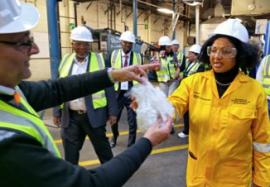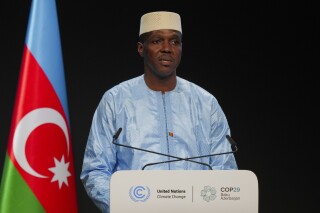
CAPE TOWN, Sept 17 (NNN-SANEWS) — A new PET (polyethylene terephthalate) processing facility, which can accommodate more plastic waste and is the first-of-its-kind technology for Africa, will come on stream in 2025.
This was announced on the sidelines of the International Solid Waste Association’s (ISWA) annual conference where South Africa’s efforts to build a circular economy for post-consumer packaging was thrust into the spotlight.
The ISWA’s annual conference saw the country’s most experienced producer responsibility organisation, Petco, and recycling partner, Extrupet, giving a site tour of the new PET processing facility.
The facility, which houses the new R300 million project, will bring PET bottle-to-bottle recycling capability to the Western Cape for the first time.
The facility will add an extra 15,000 tonnes per annum of food-grade recycled PET (rPET recycled polyethylene terephthalate) output capacity.
Extrupet Joint Managing Director Chandru Wadhwani said 64% of South Africa’s PET plastic bottles were currently collected for recycling.
“With this increased capacity, we will be able to accommodate more plastic waste and strengthen South Africa’s position as a circular economy leader in Africa and the world,” Wadhwani said on Monday in Cape Town.
Deputy Minister of Forestry, Fisheries and the Environment Bernice Swarts said the facility adds value to the country’s efforts to increase the collection and recycling rates for packaging materials, including PET.
“We view the facility as an opportunity to stimulate a demand for more PET materials and a supply of these by waste pickers and waste small, medium, and micro enterprises (SMMEs), thus creating stable markets for PET.
“The facility needs to be fed and the collection system needs to be improved in order to meet the demand of this facility.
“Waste pickers are an important contributor to the supply of the input material of plastic waste and we look forward to seeing the implementation of the waste picker service fee in order to continue to enable these waste pickers to do their work effectively and efficiently,” Swarts said.
Petco CEO Cheri Scholtz said the additional capacity would assist in closing the loop for PET, which is the most widely recycled plastic polymer that can be turned into another food- grade product.
“So, this increase in capacity takes us another tangible step towards that circular economy, in which a bottle becomes a bottle over and over again and keeps that material in circulation at its highest possible value,” Scholtz said.
This year’s ISWA conference is taking place under the theme: “Waste to Wealth: Solutions for a Sustainable Future”.
As the host country, South Africa has demonstrated its commitment to sustainable development with a focus on building a circular economy and the introduction of extended producer responsibility (EPR) regulations that require producers to take responsibility for their packaging waste throughout its life cycle.
Scholtz said, as a Producer Responsibility Organisation, Petco worked with government to contribute to policy development and the implementation of EPR legislation and helped its members to meet their legislated targets for collection, recycling and the inclusion of recycled content in their packaging, which increased year on year.
She said the key to success lay in building a sustainable value chain that could survive the economic peaks and troughs, by balancing collection with recycling capacity and stimulating.
“It doesn’t just happen overnight; it has been a journey. Petco and Extrupet have been working together for more than 20 years to build a solid foundation.
“Petco’s commitment of ongoing support to our 10 contracted recycling partners, like Extrupet, gives them the confidence to invest in the new equipment and infrastructure that is needed to recycle increasing tonnages of recyclable packaging.
“The support also enables recyclers to increase the gate price at which they purchase recyclable packaging, which stimulates collection on the ground by increasing the street value of this packaging and growing the local market for it, thereby making it easier for waste pickers to sell their collected packaging and earn an income from it,” Scholtz said.
She said a strong relationship with government, especially the Department of Forestry, Fisheries and the Environment, was equally important for the country to benefit as a whole.
“Having implementable regulations, strong compliance, and effective enforcement is vital. We partner with all tiers of government to support sustainable waste management and diversion initiatives, and work towards meeting sustainable development and circular economy goals.”
She said that the opening of the new plant also aligned with government’s climate change goals, as outlined in the newly signed Climate Change Bill.
The bill sets out to enhance South Africa’s ability to cut greenhouse gas emissions and build climate resilience, while reducing the risk of job losses, and promoting new job opportunities in the emerging green economy.
Wadhwani said Extrupet had established its first bottle-to-food-grade line in Johannesburg in 2009, with the second following in 2014.
“The third arrived during the COVID-19 pandemic in 2020. And the fact that this is now the fourth line in what’s, in essence, a 15-year horizon is just so gratifying for us,” Wadhwani said. — NNN-SANEWS




